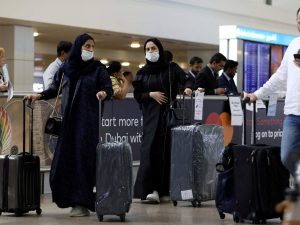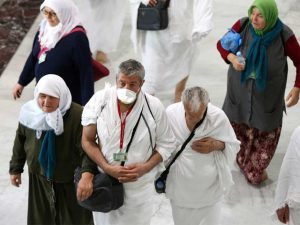By Rushali Saha

The Gulf economies have been facing a double-edged sword with the crude oil prices dropping to negative and the rapid spread of coronavirus, especially in Iran which has emerged as the epicentre of the crisis in Middle East.
Although the virus has wreaked havoc around the world, the Gulf countries have been affected by it in a way the other regions have not experienced, given the overdependence of the GCC economies on China, where the virus was first recorded. Moreover, these states have a special demographic situation arising from the presence of millions of expatriate workers who are employed in skilled and unskilled occupations in the Gulf region and are particularly vulnerable to travel restrictions imposed around the world.
The Middle East Three (ME3)- Emirates, Eithad Airways and Qatar Airways which are the largest Gulf carriers, are in deep crisis financially with Etihad laying off pilots and cancelling aircraft orders, Emirates recording lower profits in 2018/19 fiscal year and Qatar airways posting a loss of $640 million in same fiscal year.
Tourism Potential Dented
The annual Hajj and Umrah pilgrimage, which is at the core of the Gulf’s thriving religious tourism, has temporarily been halted. This comes at a time when the UAE was looking to diversify its non-oil income with its Vision 2030, released in 2016 and is already lagging on most of its interim targets for 2020, where tourism was given a priority. A significant aspect of the vision was to turn the UAE into one of the top five tourist destinations in the world and create 1 million new jobs in the tourism sector. This plan will now obviously be hit as global predictions suggest a serious lasting economic impact on the tourism sector.
SARS accounted for a drop in international tourist arrivals of almost 9.4 million and a loss of between US$30 billion and $50 billion. Latest predictions suggest that depending on how long the restrictions and warnings are in place, losses could be double those in 2003. Business is also likely to take a hit, whether it is intra-GCC or international in view of the unprecedented health and security concerns unleashed by the pandemic. Dubai was all set to launch its flagship business Expo 2020 in October of this year, which in all likelihood will be cancelled and further hamper the already troubled economy.
Migrant workers & remittances

Even within these countries, the migrant workers have been disproportionately affected as they find themselves locked down, some laid off and stranded away from their home countries without any place to turn to for help. The Gulf producers have previously handled periods of economic low by transferring the burden on to the expatriate workers, by stopping fresh recruits, reducing salaries of workers effectively forcing the workers back to their low-income home countries. But due to the coronavirus, Beirut, Lebanon, Qatar have locked down thousands of migrant workers in crowded neighbourhoods forcing them to remain stuck in cramped, unsanitary dorms miles away form their home. Although migrant communities all over the globe are disproportionately sharing the brunt of the travel restrictions, including India, due to the sheer size and diversity of migrant community in these regions the losses will echo across the continents in the form of reduced foreign remittances. Remittances from the Gulf are an important source of foreign currency for Asian and other Middle East countries, with the World Bank reporting outflows of $44.4bn and $36 bn from UAE and Saudi Arabia respectively in 2017.
China Factor
From 2000 to 2017, China-GCC trade grew from just under US$10 billion to nearly US$150 billion and in recent years China has become a major economic partner for the GCC. A significant development in this regard was the US entry into the oil market with its revolution in shale energy in 2014 capturing a sizeable portion of the global oil consumers, but this was overcome by Saudi’s selling cheaper oil to China which needed it desperately during its slowdown of 2015-2016, making them dependent on China as a customer. According to a recent report by S&P Global, China’s contribution to the export markets of the GCC countries ranges from 4% (UAE) to as much as 45%(Oman). Moreover due to natural conditions, domestic food production has remained a serious challenge for the GCC countries which have been able to overcome the same through food imports Although these countries have various strategies in place given the difficulties in domestic production such as stockpiling, directly investing in producing companies, purchasing or leasing farmlands abroad, the pandemic will inevitable create a disruption in supply chain and aggravate the economic slowdown.
The negative impact of the unprecedented challenge posed by coronavirus on these economies should push the Gulf policy makers to reassess their spending and put their experience in dealing with Middle East Respiratory Syndrome, another corona disease, to effective use. Despite being financially more comfortable than many other countries in the region and having better medical facilities, the Gulf economies have not been spared from the wrath of the virus effectively proving that no one wins in a contagion.
(Rushali Saha is Research Intern at India Writes Network)
Author Profile
- India Writes Network (www.indiawrites.org) is an emerging think tank and a media-publishing company focused on international affairs & the India Story. Centre for Global India Insights is the research arm of India Writes Network. To subscribe to India and the World, write to editor@indiawrites.org. A venture of TGII Media Private Limited, a leading media, publishing and consultancy company, IWN has carved a niche for balanced and exhaustive reporting and analysis of international affairs. Eminent personalities, politicians, diplomats, authors, strategy gurus and news-makers have contributed to India Writes Network, as also “India and the World,” a magazine focused on global affairs.
Latest entries
 DiplomacyOctober 4, 2025UNGA Resolution 2758 Must Not Be Distorted, One-China Principle Brooks No Challenge
DiplomacyOctober 4, 2025UNGA Resolution 2758 Must Not Be Distorted, One-China Principle Brooks No Challenge India and the WorldJuly 26, 2025MPs, diplomats laud Operation Sindoor, call for national unity to combat Pakistan-sponsored terror
India and the WorldJuly 26, 2025MPs, diplomats laud Operation Sindoor, call for national unity to combat Pakistan-sponsored terror India and the WorldJuly 25, 2025When Fire Ends, Diplomacy Begins
India and the WorldJuly 25, 2025When Fire Ends, Diplomacy Begins India and the WorldJuly 16, 2025Operation Sindoor and its Aftermath: India’s Successful Diplomatic Outreach
India and the WorldJuly 16, 2025Operation Sindoor and its Aftermath: India’s Successful Diplomatic Outreach







